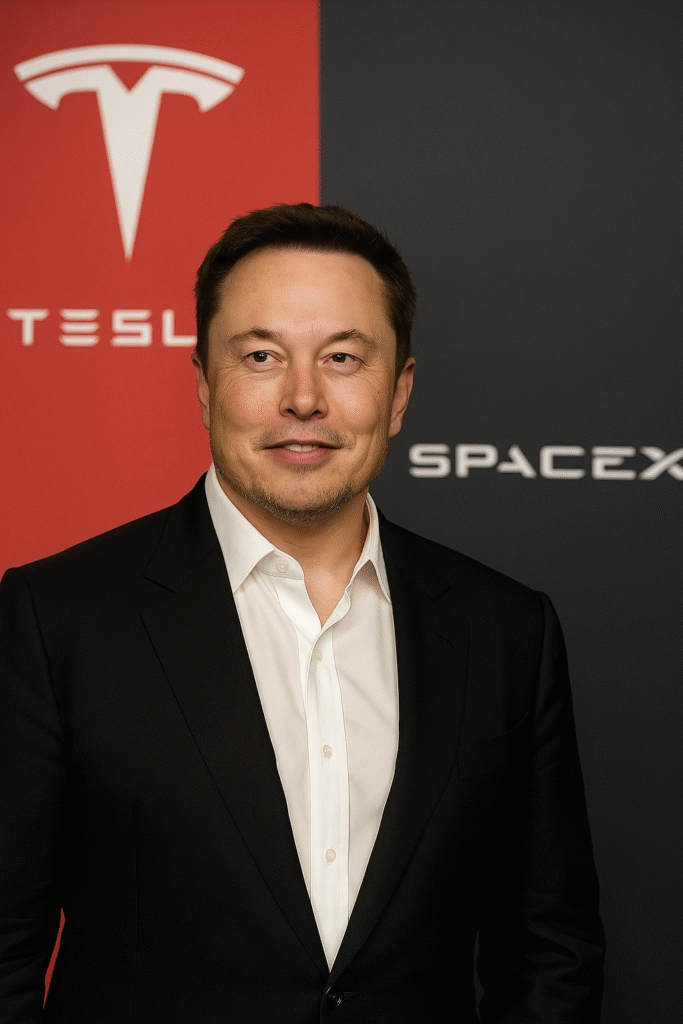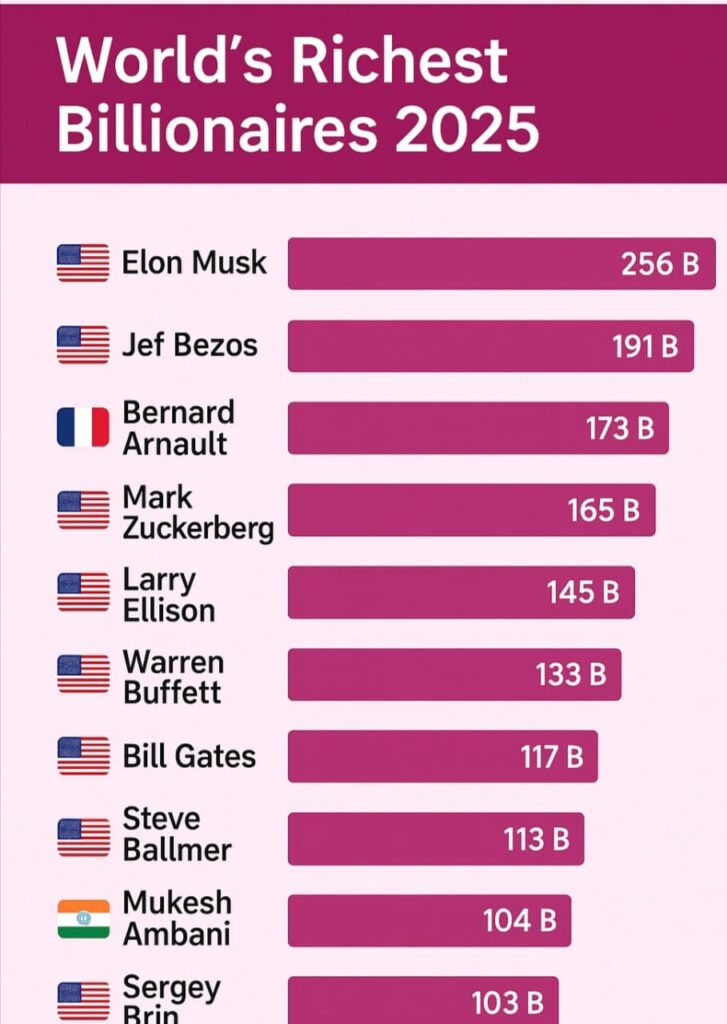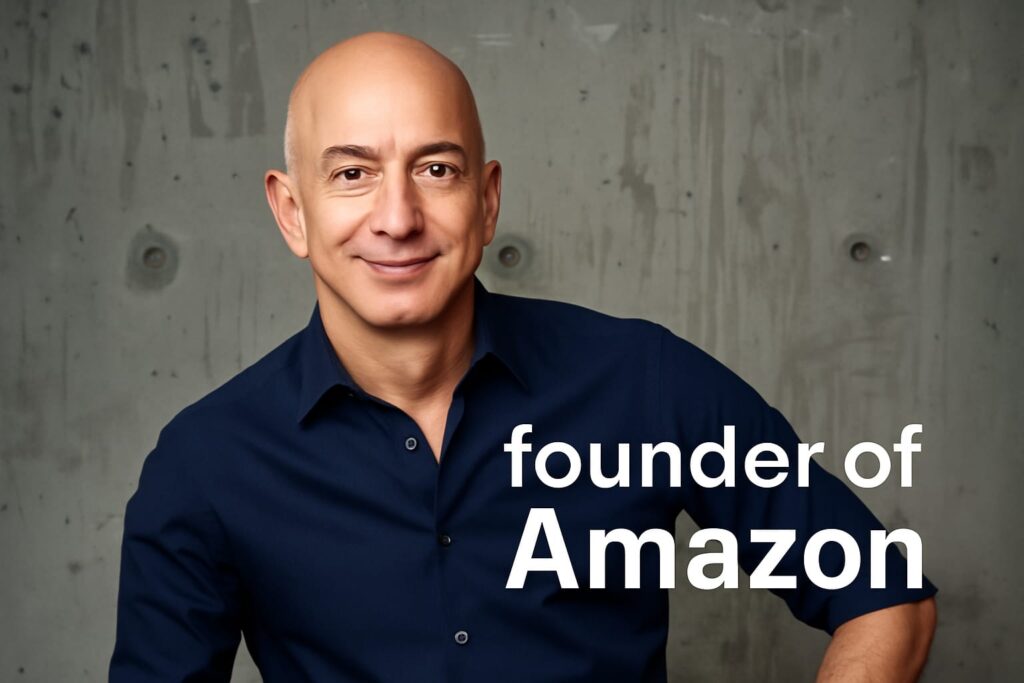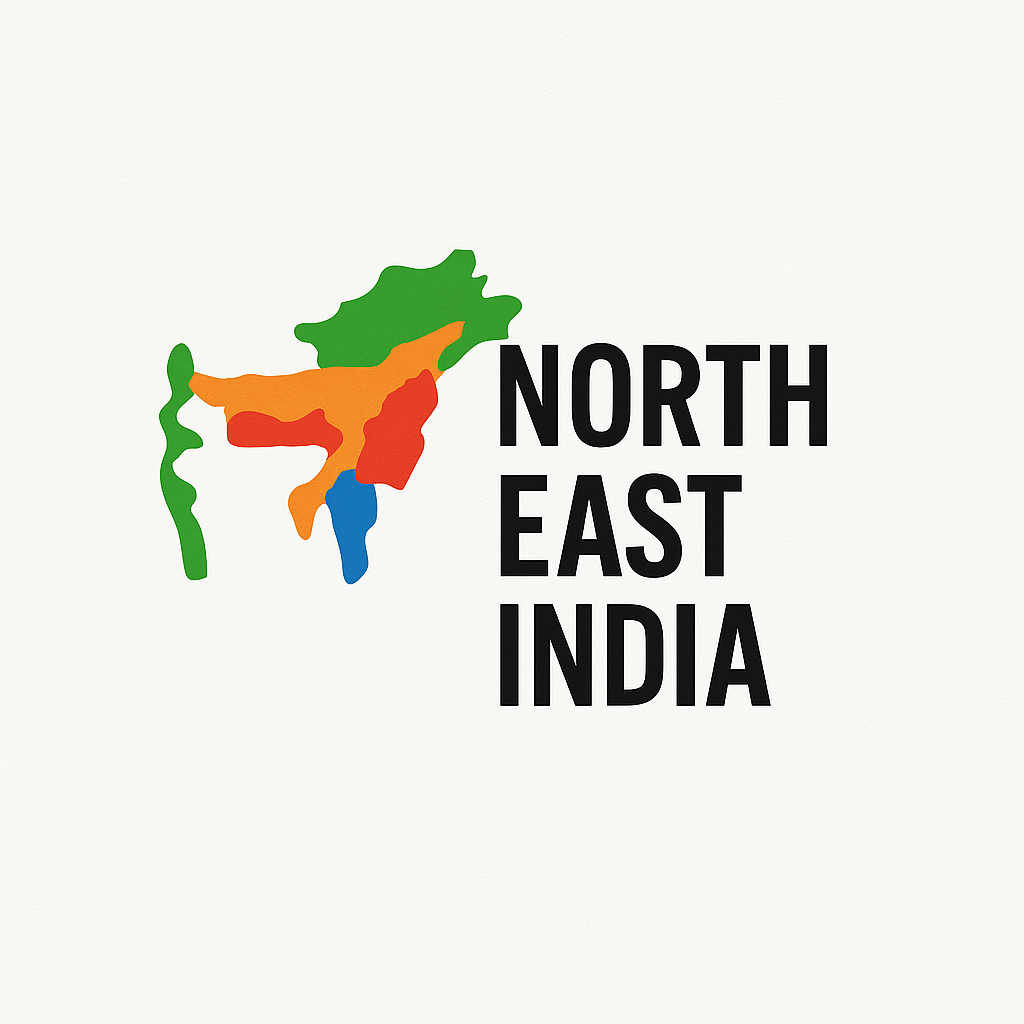
In a world of over 8 billion people, how is it that 9 of the top 10 richest billionaires are Americans? What’s so unique about the United States that it consistently produces the world’s wealthiest individuals, leaving behind most of Europe, Asia, and the rest of the globe?
This isn’t just a matter of numbers; it’s a reflection of power, innovation, and opportunity. Let’s break down the reasons why America has a near monopoly on ultra-rich billionaires, and why only one person from Europe made it into this elite club.
The Top 10 Richest Billionaires List 2025: 9 Americans, 1 European
First, the basics. The 2025 billionaire leaderboard is a mirror of modern global power. As of now:
- 9 of the top 10 richest billionaires are Americans
- Only 1 billionaire in the top 10 is from Europe
- No one from Asia, Africa, South America, or the Middle East appears in this elite list
It’s shocking, but not random. The reasons lie in how wealth is created, multiplied, and sustained in different regions.
Elon Musk Biography 2025: From Childhood Genius to Tech Billionaire & Space Visionary
The Rise of American Billionaires: What’s Driving It?
1. Silicon Valley’s Golden Engine
Most of the American billionaires in the top 10 are tech giants. They didn’t inherit money—they built software platforms, AI companies, space tech, and global e-commerce systems. From social media to electric vehicles, these individuals dominate industries that were practically born in America.
The U.S. tech ecosystem is unlike anything else in the world. What makes it so powerful?
- Massive venture capital funding
- Open access to global talent
- Universities that support innovation (like Stanford, MIT)
- Culture of risk-taking and failing forward
No other country has replicated this formula at the same scale. And that’s why 9 of the top 10 richest billionaires are Americans—because the soil for billionaire-making is incredibly fertile.
2. The Power of Public Markets
Wealth isn’t just about owning companies. It’s about what those companies are worth on paper. In the U.S., once you create a successful business, you can list it on the stock exchange and multiply your wealth.
Billionaires like Jeff Bezos and Mark Zuckerberg became ultra-rich not just because they owned companies—but because the stock market valued those companies in the hundreds of billions.
American financial systems allow for:
- Fast and large Initial Public Offerings (IPOs)
- Global investor participation
- High tech valuations
This is a major reason why American billionaires dominate the top 10 list.
🧠 Jeff Bezos Biography 2025: Amazon Founder’s Inspiring Journey, Failures & Leadership Insights
3. Personal Branding and Media Culture
American billionaires are not just wealthy—they are public figures. Elon Musk, for instance, is more than a CEO. He’s a cultural icon, influencer, and brand. This visibility boosts not just public interest but also investor confidence.
The U.S. media landscape helps billionaires maintain relevance and clout, which further inflates their wealth. The more attention they get, the more valuable their companies become.
It’s no surprise then that 9 of the top 10 richest billionaires are Americans—they know how to play both the money game and the media game.
The Lone European: Why Only One Made the Cut
The only non-American in the top 10 richest is a European billionaire—likely someone rooted in luxury, fashion, or legacy industries. While Europe is full of old money and family wealth, it struggles to breed ultra-wealthy individuals at scale today.
Why?
- Tougher tax laws and income ceilings
- Cultural attitudes against extreme wealth
- Less aggressive startup culture
- Smaller domestic markets
Even though Europe has powerful companies, it doesn’t have the same culture of hyper-entrepreneurship or aggressive global expansion. That’s why only one European billionaire cracked the top 10, while 9 of the top 10 are Americans.
Adani vs Ambani in 2025: The Billionaire Battle for India’s Future
A Glimpse into the Billionaire Mindset
What separates a billionaire from a millionaire? Mindset.
American billionaires think in terms of world domination. They’re not just building a company for a country—they’re solving global problems, building electric cars for everyone, connecting the world with apps, or exploring outer space.
Here’s how many of them think:
- “How can I reach 1 billion people?”
- “How do I make this 10x faster, cheaper, better?”
- “How can I use AI, robotics, or space to reshape the future?”
This grand vision is uniquely encouraged in the U.S.—and that’s another reason why 9 of the top 10 richest billionaires are Americans.
From Garage to Global: The American Dream Is Real (For Some)
Many top U.S. billionaires started from humble beginnings:
- Elon Musk coded video games at age 12
- Jeff Bezos built Amazon from a garage
- Mark Zuckerberg wrote Facebook in a dorm room
This “from zero to billionaire” story still resonates strongly in the U.S. It’s no myth. With the right environment, risk appetite, and relentless work ethic, people still build empires from scratch.
And that’s why, again, 9 of the top 10 richest billionaires are Americans—because the system allows and rewards outsized ambition.
How the Numbers Shifted Over Time
This wasn’t always the case.
- In the 1990s and early 2000s, oil magnates, industrialists, and European heirs often featured in the top 10
- But as the digital economy exploded, American tech companies skyrocketed in value
- This tilted the scales in favor of U.S.-based innovation entrepreneurs
As the world moves deeper into AI, quantum computing, and automation, the rich are only going to get richer—and most will likely still be American.
What About Asia, Africa, Latin America?
Despite their population size and growing economies, these continents are not producing top 10 billionaires yet. Why?
- Capital is concentrated in fewer hands
- Local markets are huge but fragmented
- Less mature venture and IPO systems
- Government policies often stifle large wealth accumulation
In the second half of this blog, we’ll explore:
- The social consequences of billionaire dominance
- What it means when 9 out of 10 richest people are from one country
- Will this trend continue or shift?
- Can India or China break into the top tier?
- And the moral dilemma: Should anyone be this rich?
When Wealth Gets Concentrated — The Bigger Picture
The fact that 9 of top 10 richest billionaires are Americans isn’t just a trivia fact. It’s a window into how power, money, and innovation are concentrated today—and how that affects the world.
Economic Power = Global Influence
The top American billionaires don’t just run companies. They influence:
- Global financial markets
- National policies
- Consumer behavior
- Even technological ethics (e.g., AI development, space colonization)
Their decisions can move stock markets or change regulations. When 9 out of 10 people with that kind of power come from one country, it naturally shifts global balance toward the U.S.
Is It Good or Bad That 9 of Top 10 Richest Billionaires Are Americans?
There are two ways to look at it:
Optimistic view:
- America rewards innovation.
- The system creates self-made billionaires.
- These billionaires build tech that transforms the world.
Critical view:
- Wealth inequality keeps rising.
- Power is concentrated in too few hands.
- Billionaires are unaccountable yet hugely influential.
Regardless of which side you’re on, there’s no denying that when 9 of the top 10 richest billionaires are Americans, it raises questions about fairness, access, and the future of capitalism.
Will This Trend Continue Beyond 2025?
The short answer: Most likely, yes—unless there’s a major disruption.
Reasons this pattern may continue:
- U.S. remains ahead in AI, biotech, robotics, and space
- Capital markets are still the deepest and most dynamic
- American startups grow faster due to global reach and risk appetite
But watch out for challengers:
- India’s tech sector is booming
- China is pushing forward with AI, EVs, and fintech
- Middle Eastern sovereign funds are creating mega-investment vehicles
Still, until other regions can replicate America’s innovation infrastructure, it’s likely that most of the top billionaires will remain American.
Burj Al Arab: The Story Behind the World’s Most Iconic Hotel
Could India Crack the Billionaire Top 10 Soon?
India has potential:
- A massive domestic market
- Fast-growing digital economy
- Unicorns like Flipkart, Byju’s, and Ola
- Billionaires like Mukesh Ambani and Gautam Adani
But barriers remain:
- Regulatory unpredictability
- Slow IPO processes
- Over-reliance on legacy sectors
If India produces the next big AI or global fintech leader, it could change the game. But for now, 9 of top 10 richest billionaires are Americans, and India still plays catch-up.

🔥 The Human Side of Billions: How They Got There
Even though 9 of the top 10 richest billionaires are Americans, they didn’t get there overnight. Each of them followed a unique path filled with risk, rejection, bold decisions, and often, personal struggle. Below is a quick look at their main business, a key challenge they faced, and one memorable or lesser-known story from their life journey.
🧠 1. Elon Musk – Tesla, SpaceX, xAI (Top 10 Richest Billionaires)
Net Worth: ~$408 billion
Country: USA
Industry: EVs, space tech, AI, tunneling
Struggle:
After selling PayPal, Musk invested almost all his money into Tesla and SpaceX, both of which nearly went bankrupt in 2008. He was living off loans from friends and working 20+ hour days.
Interesting Story:
Musk famously slept on the floor of the Tesla factory during Model 3 production hell in 2017. “I was literally living in the factory… I didn’t have time to go home or even shower,” he said later. This obsession with solving problems on the ground inspired even senior engineers.
💻 2. Larry Ellison – Oracle (Top 10 Richest Billionaires)
Net Worth: ~$296 billion
Country: USA
Industry: Enterprise software, cloud
Struggle:
Dropped out of two colleges. Grew up in a modest Jewish household in Chicago and was adopted by relatives. He didn’t speak to his adoptive father for years.
Interesting Story:
Ellison once outbid Steve Jobs to buy a Japanese Zen temple simply because Jobs liked it. Later, he gave it away as a gift. His larger-than-life, competitive spirit made Oracle a global tech powerhouse.
📦 3. Jeff Bezos – Amazon (Top 10 Richest Billionaires)
Net Worth: ~$243 billion
Country: USA
Industry: E-commerce, cloud, logistics, AI
Struggle:
In the early Amazon days, people mocked the idea of an online bookstore. His company was operating at a loss for years, and he was constantly criticized by Wall Street.
Interesting Story:
Bezos drove books to post offices himself in a beat-up Chevy Blazer, kneeling in the cargo area to pack orders. He even rigged a desk out of a door nailed to two-by-fours to save money—those “door desks” are now Amazon tradition.

📱 4. Mark Zuckerberg – Meta (Facebook) (Top 10 Richest Billionaires)
Net Worth: ~$241 billion
Country: USA
Industry: Social media, virtual reality, tech
Struggle:
Zuckerberg dropped out of Harvard and was sued by his former friends, who claimed he stole the Facebook idea. He was also grilled by Congress later over privacy issues.
Interesting Story:
Early investors pressured Zuck to sell Facebook to Yahoo for $1 billion in 2006. He refused, saying, “I think we can do more.” That decision cost Yahoo a trillion-dollar future and made Facebook a legend.
🌐 5. Larry Page – Google (Alphabet) (Top 10 Richest Billionaires)
Net Worth: ~$160 billion
Country: USA
Industry: Search, advertising, tech innovation
Struggle:
When Page and Sergey Brin tried to sell Google to Yahoo for just $1 million, Yahoo said no. Ironically, Google is now worth over $2 trillion.
Interesting Story:
Larry Page used his first big Google check to build a flying car prototype and invest in health startups that aim to reverse aging. He once said, “If you’re not doing some things that are crazy, then you’re doing the wrong things.”
🔍 6. Sergey Brin – Google (Alphabet) (Top 10 Richest Billionaires)
Net Worth: ~$153 billion
Country: USA
Industry: Search, AI, data science
Struggle:
Born in the Soviet Union, Brin’s family faced anti-Semitic oppression, leading them to flee to America when he was six. That immigrant story shaped his love for freedom and information.
Interesting Story:
At Google, Brin led the now-famous “20% time” policy—employees could use 20% of their time to work on personal ideas. Products like Gmail and Google Maps were born from this freedom.
🤖 7. Jensen Huang – NVIDIA (Top 10 Richest Billionaires)
Net Worth: ~$152 billion
Country: USA (Taiwan-born)
Industry: AI chips, gaming, hardware
Struggle:
As a kid, Huang cleaned toilets in a Kentucky boarding school where he was sent at age 9, not knowing English. He later studied electrical engineering and co-founded NVIDIA in a Denny’s diner.
Interesting Story:
In 2022, NVIDIA’s chips unexpectedly became the backbone of the AI revolution. Huang told employees, “We were born for this moment.” By 2025, NVIDIA became more valuable than Amazon.
👔 8. Bernard Arnault – LVMH (Louis Vuitton, Dior, Sephora) (Top 10 Richest Billionaires)
Net Worth: ~$147 billion
Country: France
Industry: Luxury fashion, retail
Struggle:
After graduating, Arnault’s first job was with his father’s small construction company. He bet the entire family business to acquire a struggling textile group that owned Christian Dior.
Interesting Story:
He once sent fake buyers to sabotage an auction, then outbid everyone to gain control of LVMH. His tactics were controversial but effective—he built the world’s biggest luxury empire.
🪟 9. Steve Ballmer – Microsoft (Top 10 Richest Billionaires)
Net Worth: ~$144 billion
Country: USA
Industry: Software, cloud, enterprise
Struggle:
Ballmer dropped out of Stanford MBA and joined Microsoft when it had only 30 employees. He was later blamed for Microsoft missing the mobile revolution, drawing heavy criticism.
Interesting Story:
After retiring, Ballmer bought the LA Clippers NBA team for $2 billion in cash—he danced like crazy during his first game, instantly winning over fans. Now, the team’s valuation has more than tripled.
📉 10. Warren Buffett – Berkshire Hathaway
Net Worth: ~$142 billion
Country: USA
Industry: Investments, insurance, consumer goods
Struggle:
Rejected by Harvard Business School, Buffett had a slow early career and spent years buying undervalued textile companies before discovering insurance and compound investing.
Interesting Story:
Buffett still lives in the same modest Omaha house he bought in 1958. He eats McDonald’s and drinks Coca-Cola daily, proving wealth doesn’t have to change your habits—just your options.
Final Thoughts — What Does This Billionaire List Really Say About the World?
At the heart of it, the billionaire rankings aren’t just about money.
They reveal:
- Where innovation is thriving
- Which countries encourage large-scale wealth creation
- How quickly individuals can grow their influence
That 9 of top 10 richest billionaires are Americans isn’t just a statistical quirk. It’s a clear indicator of how the world is shaped—by technology, ambition, and a system built for scale.
Whether that’s inspiring or concerning is up to you to decide.
